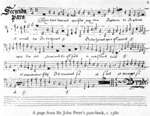
|
William Byrd (1543-1623) and Music at Ingatestone Hall, 1589 William Byrd was called 'a Father of Music' in the register of musicians employed by James I. Byrd's Psalms, Sonnets and Songs of 1588 was only the third English song book ever to have been published. Several of his pieces for virginals were published in Parthenia, which was the first work to be printed in English for the instrument which is a smaller and simpler version of the harpsichord. 70 of the 250 pieces in the Fitzwilliam Virginal Book are by Byrd. He has been termed the 'greatest among the many great English composers of his time'.77 Two sets of Mr.Byrd's books entitled Gradualia survive in the Petre collection. They are 'part books'. The first contains the bass voice part of a collection of Latin Motets mainly by English composers of the C16th. The second of these was dedicated to John Petre in 1607 and contains alto and bass parts of foreign composers like Criquilton and Jacob Vaet.78 John Petre was one of Byrd's patrons and Byrd visited Ingatetone Hall on several occasions, notably at Christmastide in 1589. Byrd spent the last thirty years of his life as a near neighbour in the Essex village of Stondon Massey. Anthony Wood, Oxford Antiquary and gossip, has notes on William Byrd who was 'bred up to musick under Thos. Tallis'.79 Thomas Tallis was the last master of the music at the Augustinian Abbey of the Holy Cross at Waltham Abbey in Essex immediately before its dissolution in 1540.
|
||||
 |
